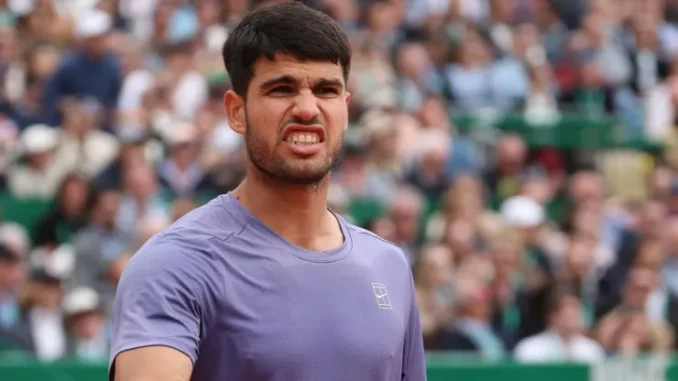
At just 21, Carlos Alcaraz has scaled dizzying heights in professional tennis, claiming four Grand Slam titles and a stint as the world No. 1. Yet, the Spanish sensation’s relentless pursuit of greatness comes with a mental toll, and in a candid revelation, he has shared his unconventional method for unwinding from the sport’s intense demands. In the newly released Netflix docuseries Carlos Alcaraz: My Way, which premiered on April 23, 2025, the world No. 3 opens up about his need to disconnect, detailing a surprising escape to Ibiza where he embraces a carefree, party-driven break. “I end up going, and they know what I’m going there for,” Alcaraz confesses in the series. “In Ibiza, I’m not gonna lie, everything is always about partying and going out. I wanted to go there and get wasted. I’m not sure if I’m allowed to say it like that, but I just wanted to cut loose.”
The three-episode docuseries offers an intimate look at Alcaraz’s 2024 season, capturing both his on-court triumphs—defending his Wimbledon title and winning his first French Open—and off-court struggles to balance fame with personal freedom. After a mentally draining 2023, where he admitted to being “mentally exhausted” following a French Open semifinal loss to Novak Djokovic, Alcaraz sought solace in Ibiza. Despite advice from his agent, Albert Molina, and coach, Juan Carlos Ferrero, to avoid the trip, he insisted on a brief getaway. “I knew I had to talk to Albert first,” he recalls. “I said, ‘I’ve got to go, if even for two or three days to Ibiza.’” The break, though controversial within his team, proved rejuvenating, as Alcaraz returned to win Wimbledon in 2023, defeating Djokovic in a five-set epic.
Ferrero, a former world No. 1 and Alcaraz’s coach since 2018, expresses skepticism about the benefits of such escapades. “If you go to Ibiza for six days and go out every single night, by the seventh day you’ve done anything but rest,” Ferrero cautions in the series. He emphasizes the discipline required to compete at the elite level, drawing a contrast with Alcaraz’s more relaxed approach. “His understanding of work and sacrifice is so different from ours,” Ferrero notes. “It’s so different that it makes me doubt whether ‘his way’ of doing things will help him become the best in the world.” This tension between Alcaraz’s desire for normalcy and Ferrero’s pursuit of perfection is a recurring theme, highlighting the challenges of molding a young talent into a historic champion.
Alcaraz’s need to disconnect stems from the relentless demands of professional tennis. The 2024 season saw him compete in 18 tournaments, including a gold medal match loss at the Paris Olympics and a shocking second-round exit at the US Open to Botic van de Zandschulp. “The truth is that what I feel right now is that instead of taking steps forward, I have taken steps backwards in terms of my mind,” Alcaraz admitted after the US Open defeat. To cope, he has turned to activities like golf, which he played with Casper Ruud before the New York Grand Slam. “When I’m playing golf, I’m not thinking about my next match or my training schedule,” he explains. “It’s a perfect way to recharge mentally and physically.”
Despite his team’s concerns, Alcaraz remains unapologetic about prioritizing happiness. “I’m not obsessed with being the best in the world,” he told GQ España. “I was number one a few years ago, and I was happy. Now I’m number three, and I’m just as happy—enjoying the journey, the sport, and life.” This philosophy sets him apart from predecessors like Rafael Nadal, his idol, and underscores his desire to avoid tennis becoming an “obligation.” His mother, Virginia Garfia, echoes this sentiment, expressing her hope that her son avoids becoming a “thrown-away toy” in the sport’s grind, a poignant remark that resonates in the docuseries.
Alcaraz’s approach has drawn mixed reactions. Spanish veteran Roberto Bautista Agut warned that “top-level tennis demands a lot,” suggesting that late-night partying could hinder Alcaraz’s longevity. “I don’t think Carlos will win Grand Slams by going to bed at seven in the morning,” Bautista Agut remarked. Yet, Alcaraz’s results—18 ATP titles, including six Masters 1000s—suggest his method works, at least for now. His 2025 season began with a title in Rotterdam, and despite an adductor injury forcing his withdrawal from the Madrid Open, he is eyeing a strong return in Rome and Roland Garros, where he triumphed in 2024.
As Alcaraz navigates the pressures of global stardom, his Ibiza confessions reveal a young man striving to balance ambition with joy. Whether his unconventional breaks will sustain his ascent or prove a stumbling block remains to be seen, but for now, they are integral to “his way” of thriving in a demanding sport. With the tennis world watching, Alcaraz’s journey promises to be as captivating off the court as it is on it.
Leave a Reply